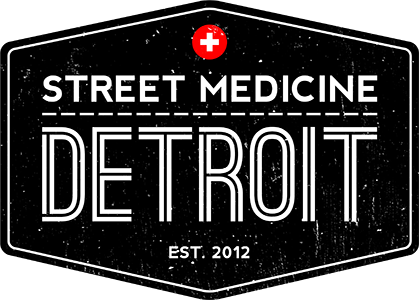SMD President Johnny Wong welcomes the new recruits
Earlier this month, over 150 Wayne State medical students joined Street Medicine Detroit for our fall training session. Wait a second, you say. Fall? It’s still August. I mean yesterday was 90 degrees. What’s this fall business about? Well, I hate to break it to you, but here at the School of Medicine we’ve been back in school for almost a month now. Believe me when I say that I hate to break it to you. Ha. It’s only a joke! Despite the unseasonal end to summer break, it’s nice to be back at Scott Hall, and it’s great to continue working with the Street Medicine Detroit crew. Presented with an incoming class of first year students itching to volunteer, we hosted our fall training session to teach students about street medicine. I know, I know, we probably should have prescribed some anti-itch cream, but we love volunteers here at SMD. The support of Wayne medical students keeps our work in the community going. They’ll just have to scratch that itch.
Nurse Practitioner Dean Carpenter
Before our new volunteers could hit the streets with us, we needed to educate them about our patient population and teach them some useful medical interviewing skills. I really need to give a shout out to our Director of Education and Training, Jawan Gorgis, who took care of all the planning and logistics for the training. Her leadership was crucial to the success of the event. In order to help our new recruits understand the unique challenges, both medical and societal, that street medicine is trying to help solve, we invited some of our partners from the community to speak. Nurse Practitioner Dean Carpenter, our lead clinical preceptor from the Tumani Center, took the podium to dispel some of the myths surrounding homelessness. He spoke about how we as clinicians need to approach our patients with compassion and openness. Something he said really stuck with me: “We are not here to judge. We’re out here to help others realize their full potential.” Good stuff, Dean. Another speaker from the Tumani Center, Ms. Lydia Adkins, talked about the importance of hope for people experiencing homelessness. She spoke about how isolating homelessness is, and how simple kindness goes a long way in helping someone cope. A former client of the Tumani Center, Robert McClinic, also joined us. Mr. McClinic had spent many years of his life homeless, but an intervention by the Tumani Center helped him find stable housing and employment. Mr. McClinic’s advice for students: Never count anyone out. There is always the chance for people to overcome their difficulties.
Guest Speaker Robert McClinic, "Never count anyone out."
After our guest speakers, the Operations Department explained what goes on during street runs. Operations Coordinator David Friedlander also stressed the importance of confidentiality with patient medical information. It’s true we dropped a lot of new information on our incoming volunteers, but it’s extremely important that our students are knowledgeable and comfortable while working on a street run. Plus, we gave them free pizza. So I don’t expect any complaints. To that end of preparing the newly minted Street Medicine volunteers, we broke off into small groups in order to give the students a chance to try their hand at medical interviewing. In my group, I role-played as a 32 year-old male patient with diabetes, which was surprisingly easy. I think I might be getting old. The students in my group were a bit shy, but beneath that shyness they seemed to know the right questions to ask. Regardless that shyness won’t last long because pretty soon they will be out on the streets and in the shelters. They’ll be face to face with a patient, and they’ll have to ask the questions. Sure, they might make mistakes (that’s why we have licensed professionals with us – to catch those mistakes!) But overtime these students will improve and learn to be great doctors. That’s the beauty of street medicine. At the same time as we are helping some of our most underserved community members, we are training our future physicians to provide competent and compassionate care right from the start.
Anthony McClafferty MSII, SMD Communications




